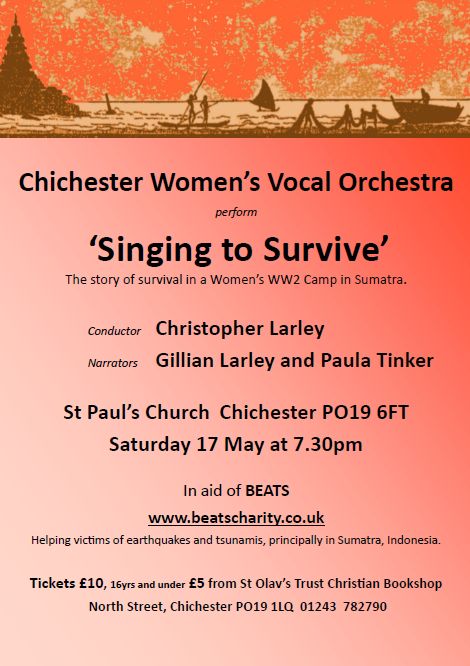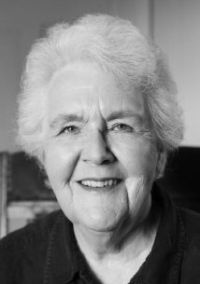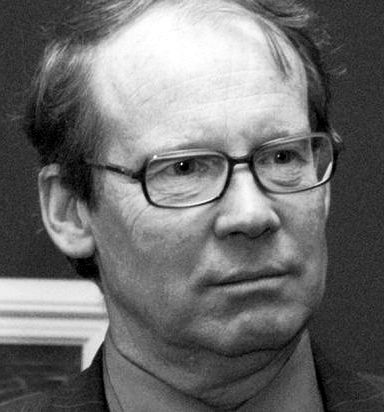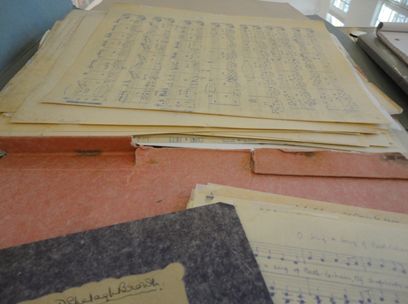The Captives’ Hymn was composed by Margaret Dryburgh in the Palembang ‘houses’ camp in 1942 and first sung by herself, Shelagh Brown and Dorothy MacLeod at a Sunday service. Thereafter the hymn was sung by the women every Sunday even throughout their later years in captivity when they encountered suffering and death all around them. When, in 1943, some internees were repatriated from Palembang to Singapore, the hymn was taken with them and, as a result, it found fame in camps there too.

Norah Chambers transcription of the The Captives’ Hymn, dictated to her by Margaret Dryburgh
Father in captivity
We would lift our prayers to Thee,
Keep us ever in Thy Love.
Grant that daily we may prove
Those who place their trust in Thee
More than conquerors may be
Give us patience to endure
Keep our hearts serene and pure,
Grant us courage, charity,
Greater faith, humility,
Readiness to own Thy Will,
Be we free or captive still
For our country we would pray
In this hour be Thou her stay.
Pride and selfishness forgive,
Teach her, by Thy Laws, to live,
By Thy Grace may all men see,
That true greatness comes from Thee.
For our loved ones we would pray
Be their guardians, night and day,
From all dangers, keep them free,
Banish all anxiety.
May they trust us to Thy care,
Know that Thou our pains dost share.
May the day of freedom dawn
Peace and justice be reborn,
Grant that nations loving Thee
O’er the world may brothers be,
Cleansed by suffering, know rebirth,
See Thy Kingdom come on earth.
When the survivors of the Sumatran camps were reunited by researcher Lavinia Warner for Margot Turner’s This Is Your Life in 1978, it was their singing of The Captives’ Hymn which inspired her to explore the story of their captivity further.
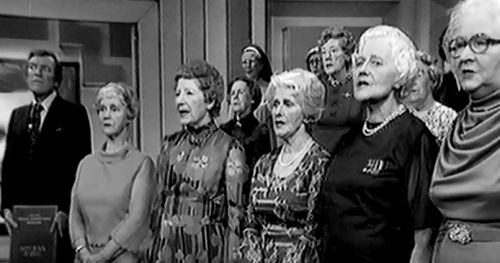
The reunited internees sing The Captives’ Hymn on Dame Margot Turner’s This Is Your Life in 1978 (© Thames Television)
‘Now this little group of survivors from those days gathered around Margot Turner and, unaccompanied as they had been then, and a little hesistantly at first in these strange surroundings, they began to sing. But as the words flooded back and their confidence grew there was a truly remarkable transformation. The years visibly fell away from them and the cloak of their reserve disappeared so that they were the young women again, vulnerable, beleaguered, a little afraid but taking strength from each other, as they must have done them… It was suddenly apparent that an extraordinary sisterhood had existed between these women in those days when they faced a common peril and had last sung The Captives’ Hymn together. It was that glimpse of such a powerful bond between women who had gone on to lead the rest of their lives so much like everybody else, that made it imperative to know more about them and the experience they had shared all those years ago.’
[Page 2, Women Beyond the Wire]
Warner’s later research led to the Omnibus documentary Women in Captivity (1979) and thereafter to the drama series Tenko (1981-85), and, with John Sandilands, the seminal book on the topic Women Beyond the Wire (1982).
The Captives’ Hymn has been featured on Songs of Praise, is used at VJ Day services, and still sung to this day by women’s choirs all around the world.

